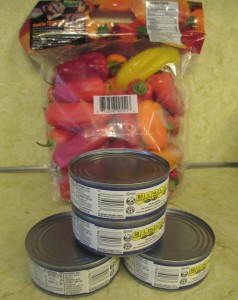Pros and Cons of Processed Foods
As a registered dietitian, I encourage my clients to eat less processed foods and more whole foods. “Choose your foods in the form closest to the ground,” I tell them. But truth be told, in this society where working moms are constantly on the go, they inevitably turn to some processed food. Is this good or bad? Favorable or unfavorable?
Food processing is a set of methods and techniques that change a food and/or its ingredients before we eat it. Some common methods include cooking, freezing, drying, canning, salting, fortifying and preserving. Other forms of food processing include methods used to make ready-to-eat meals, such as frozen dinners and frozen pizzas which are reheated before eaten.
There is a lot of debate lately on the “good” and “bad” of processed foods. Some of the negatives include: added unhealthy ingredients, loss of nutrients and high calorie content. Ingredients added to processed foods that pose a potential health risk include sugar, high fructose corn syrup, salt, fat, artificial colors and flavors. These ingredients are added often as preservatives or to improve taste, texture and appearance of foods. Loss of nutrients can vary between 5 and 20 percent of most nutrients. Dietary fiber is lost when processing whole grains into refined grains. Oftentimes processed foods have a high caloric content with very little nutrients, which leads to weight-gain and obesity.
There are two sides to every story, so it’s only fair we go over some of the advantages of food processing. These advantages include safety of food, extended shelf-life and seasonal availability. Fresh produce, raw meats, eggs, and foods that come directly from the local farmer can contain microorganisms that cause illnesses and death. Food processing reduces incidences of foodborne illnesses. Processed foods have longer shelf life which is convenient for many individuals and reduces food waste. Food processing also enables transportation of perishable foods, making them more available to areas further from where they are originally grown. In addition, food processing allows the consumer to have foods throughout the year that would normally only be around in certain seasons. Canned and frozen fruits and vegetables which are picked and processed at the time of ripeness are always available year round.
All processed foods are not equal to each other. It’s important to take the advantages and negatives into account and learn to choose the processed foods that optimize your health, and not harm your health. What do I mean? As mentioned, while I encourage clients to choose foods in their whole form, in some cases you may need to choose some processed food as a matter of convenience. If this is the case, I recommended you start with “less processed” or “minimally processed foods” such as bagged salad, whole grain bread, and cut-up vegetable sticks. Did you know that pasteurized milk is considered processed, albeit minimally processed, but still processed? Would you ever consider drinking unpasteurized milk? I think not. Foods a little more processed include frozen and canned fruit and vegetables, dried fruit, cereals, pasta, rice, crackers, cheese and yogurt. More processed foods which should be seriously limited and most times avoided include frozen dinners, frozen convenience foods, canned soups, chips and soda, to name a few.
So the next time you are shopping and find yourself in the frozen food aisle, think twice and head to the fresh fruit and vegetable aisle.


Wow! This could be one particular of the most useful blogs We’ve ever arrive across on this subject. Actually Excellent. I’m also an expert in this topic so I can understand your hard work.